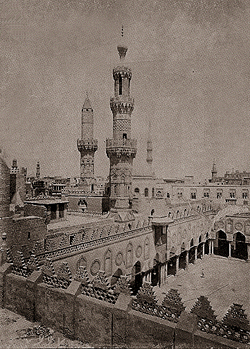|
Al-Azhar is a
momentous mosque, whose foundation was laid by gohar Al-Siqilli, the
army commander of Al- Mu'iz Lidinallah,
 the
Fatimid, during his building of the city of Cairo in 358 A.H., 969
A.D., following his conquest of Egypt. The Mosque was built in
two-years time, and prayers were performed inside it for the first
time on 7th Ramadan, 361,A.H. the
Fatimid, during his building of the city of Cairo in 358 A.H., 969
A.D., following his conquest of Egypt. The Mosque was built in
two-years time, and prayers were performed inside it for the first
time on 7th Ramadan, 361,A.H.
With the passage of ages, the Mosque earned a great reputation.
Besides being a mosque, it also became a university for religious,
Arabic and metaphysical sciences.
Al-Azhar ( in Arabic: the most
flourished and shining) was so called either because it was
surrounded by great glittering places, or as a hopeful disposition,
or after the name of Sayeda Fatima Al-Zahra', daughter of the
Prophet Mohammed may Allah's peace and blessings be upon him,
following the conqueror's usage of ascribing themselves to her
Studies. began in Al-Azhar in
Ramadan, 365,A.R., October,975,A.D., when Chief Justice Abul Hasan
Ali ibn Al-No'man started teaching the book "Al-Ikhtisar",on the
Shiite Jurisprudence. Other studies followed, and these studies advanced in the days of Al-Aziz., the
Patimid, when university-pattern Studies took their first step. In
Al-Azhar Mosque, Minister Yacoub ibn Kalas, taught his book
"Al-Risalah Al-Aziziyah" on Sh.iite Jurisprudence. Thirty seven
scholars were also appointed to help teach the students, on monthly
salary basis. Hostels were constructed for their accommodation
adjacent to Al-Azhar.
followed, and these studies advanced in the days of Al-Aziz., the
Patimid, when university-pattern Studies took their first step. In
Al-Azhar Mosque, Minister Yacoub ibn Kalas, taught his book
"Al-Risalah Al-Aziziyah" on Sh.iite Jurisprudence. Thirty seven
scholars were also appointed to help teach the students, on monthly
salary basis. Hostels were constructed for their accommodation
adjacent to Al-Azhar.
Later, and with the passage of time, the studies advanced further
and varied in subject, comprising the four schools of Islamic Creed.
The Shiite sect was overshadowed, leaving Al-Azhar as the principal
seat for The Sunni sect. It was attended by students from all Muslim
Countries.
During the reign of Khedive Ismail,
the first statute for Al-Azhar was promulgated in 1822,A.D., whereby
the steps for procurement of "Al-Alamiyah" Certificate and the
relevant subjects to be studied were specified. Then, other laws
regulating education at Al-Azhar foll- owed, most important of which
was the 1950 law, which divided education there into three
categories, and introduced the faculty-education system, Faculty Of
Shariat (Islamic Jurisprudence), Faculty of Theology ( Osoul Al-
Been ), and Faculty of the Arabic Language.
By law of 1961, Al-Azhar Faculties
increased in number, and beside the theoritical faculties, other
practical and technical faculties were established, such as that of
Medicine, Engineering and Agriculture. Other theoretical and
technical faculties were founded for girls, all of which are
affiliated to the Al-Azhar university.
It is worth mentioning that all the
theoretical sciences were taught at Al-Azhar in the olden times, and
the Muslim woman had attended the tuition circles that were held at
the Mosque. The last law has in fact regulated and modernized these
studies, and established several and different departments ant
sections as it is the case at the modern universities of the world.
Al-Azhar's main departments: According to the 1961 Law, Al-Azhar is
divided into the following Departments:
|
SupremeCouncil of Al-Azhar.
Academy of Islamic
Researches.
Al-Azhar University.
Institutions Directorate. |
|
|